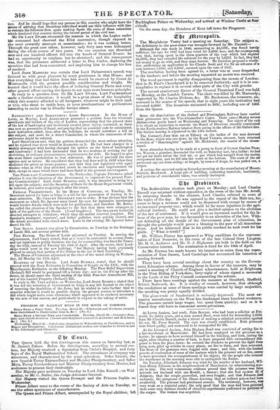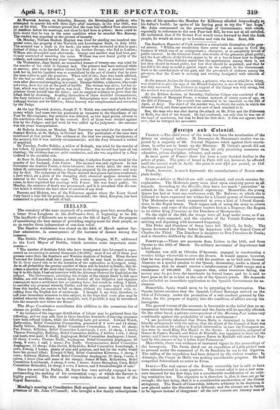Sig girobinces.
The Bedfordshire election took place on Monday; and Lord Charles Russell was returned without opposition, in the room of the late Mr. Astell. In returning thanks to the electors, Lord Charles referred to some of the topics of the day. He was opposed to the repeal of the Malt-tax, be, cause so large a revenue could not be dispensed with except by means of an increased property-tax; which would be far more injurious to the agri- cUltural interests. He could not give a decided opinion• on the abolition of the law of settlement. If it would give an increased market for the la- bour of the poor man, he was favourable to an alteration of the law. With- out defending all the details of the Government plan of education, he thought the principle would prove a blessing to the poor of all denomina- tions. And he intimated that in his public conduct he took truth for his guide. [" What is truth? "]
Mr. William Pinney has appeared as Whig candidate for the represen- tation of East Somerset, in the room of the late Colonel Gore Langton. Mr. H. G. Andrews and Mr. N. J. Highmore are both in the field on the Conservative interest. The nomination is fixed for the 10th of April.
As Mr. Frewen has made known his intention to retire from the repre- sentation of East Sussex, Lord Cantelupe has announced his intention of coming forward.
There have been several meetings about the country on the Govern- ment Education scheme. Among those in favour of the measure, may be noted a meeting of Church-of-England schoolmasters, held at Brighouse, in the West Riding of Yorkshire; forty-eight of whom signed a memorial to the Lords of the Privy Council commending the scheme. . There have been meetings against the measure at Stratford, Sheffield, Bristol, Bedworth, &c. It is worthy of remark, however, that although the resolutions at some of these meetings were carried by farge majorities, the speaking was pretty equally divided.
The glass-trade of Sunderland is seriously depressed. The most ex- tensive manufactory on the Wear has discharged three hundred workmen. The glassmen earned large wages, but spent them quickly; and so it II feared they will have to encounter severe privations.
At Lewes Assizes, last week, John Bowyer, who had been a solicitor at Pet- worth for thirty years, and a man named Steer, were tried for demanding 1,0001. from Sir Charles Burrell, under a threat of making a criminal accusation against his son, Mr. Percy Burrell. The case was clearly established. Both prisoners were found guilty, and sentenced to be transported for life.
At the Liverpool Assizes, John Higham Bond was convicted of setting fire to a hat-warehouse at Manchester. He had been employed on the premises as a hatter; he appears to have secreted himself in the building, and then, during the night, after stealing a number of hats, to have prepared with extraordinary dili- gence to burn the place down: he covered the windows to prevent the light from being seen, piled up articles in many places, set fire to them, and then retreated. The floors of the premises were flagged with stone; and this, with the limited powers of combustion of some of the matters which the prisoner set on fire, seems to have prevented the accomplishment of his object; for the people who entered the warehouse in the morning were able to extinguish the flames. On Tuesday, Elizabeth Johnson was tried for the murder of her husband, Wil- liam Henry Johnson, in the neighbourhood of Manchester, by administering arse- nic to him. The very voltmtinous evidence proved that the prisoner was false towards her husband with one Hewitt, a farmer; that she had spoken ill of Johnson; that the couple quarrelled, and even fought; and that Johnson died suddenly, the symptoms of his illness denoting that as irritant poison had been swallowed. The prisoner had purchased arsenic. The testimony, however, was very weak on a material point; the only proof that the man had been poisoned were some very dubious results of chemical experiments performed on portions of the corpse. The woman was acquitted. At Warwick Assizes, on Saturday, Bunney, the Birmingham publican who attempted to murder his wife three days after marriage, in the year 1845, was put on his trial. The evidence proved that the man had suffered from aberration of intellect before his marriage, and since he had been in prison; there could be little doubt that he was in the same condition when he assailed Mrs. Burley. The verdict was acquittal on the ground of insanity. On. Monday, William Hudson Blayne), was tried for stealing one hundred ten- pound notes, the property of the Warwick and Leamington Bank, in July 1845. The accused was a clerk in the hank; the notes were intrusted to him to post; instead of doing so, he handed them to his brother George, who fled to London; William also absconded soon afterwards. George and another man had been pre- viously convicted of receiving the notes. William was now found guilty of the robbeiy, and sentenced• to ten years' transportation. Oh Wednesday, Jane Taylor, an unmarried woman of twenty-one, was tried for the murder of her child in January last. The prisoner had been seduced while at service; after that her mother turned her from her door; a married brother took her in„ but his landlord was so scandalized by the act of charity that he gave the man notice to quit the premises. When told of this, Jane was much affected, for she had no other shelter in prospect: one night she left the house; she was soon after diecoveredstruggling in a canal; Thomas Gibbins, a labourer, who could not swim, drew her out at the peril of his life. The woman was alive; but her in- fant, which was tied in her apron, was dead. There was no direct proof that the prisoner threw herself into the water; and no surgical evidence to prove that the infant died by drowning. Availing themselves of these doubtful circumstances, the Jury returned-a verdict of acquittal. Subscriptions were made both for the unhappy woman and for Gibbins; whose bravery was complimented and rewarded by the Judge.
At the last Warwick Assizes, Joseph. P. T. Welch was convicted of embezzling money which had' come into his possession as treasurer to, the Guardians of the Poor for Birmingham; but sentence was deferred, as two legal points adverse to the conviction were raised by his counsel. Both of these were decided against him by the Judges; and last week he was called up for judgment: the sentence was ten years' transportation.
AL Bodmia Assizes, on Monday, Mary Trevertoa was tried for the murder of Samuel Mockin, at St. Mabyn, in October last. The particulars of the case were mentioned at that period. The evidence at the trial was strongly inculpatory of the accused, but it was entirely circumstantial; and the Jury returned a verdict of acquittal.
On Tuesday, Jenifer Bolitho, a widow of Redrath, was tried for the murder of her infant, by purposely withholding nourishment. She herself had been all but starviug; the evidence was not quite conclusive; and she was acquitted by a Jury inclined to the merciful side.
At Bury St. Edmund's Assizes, on Saturday, Catherine Foster was tried for the murder of her husband, John Foster, The accused was only eighteen. In last November she married Foster, a farm-labourer; three weeks after, the man was taken ill, subs:Nnently to eating a dumpling prepared by the prisoner; and next day he died. The symptoms of the illness denoted that poison had been swallowed; a fowl which ate a piece of the dumpling died; chemical analysis detected the mineral' in the viscera of the man. The woman appeared, for some unknown cause, to have regretted her marriage with Foster. She was found guilty. On Monday, the sentence of death was pronounced; and it is remarked that the con- vict heard it without the least show of emotion of any kind.
'Parsons and Hicktou, two of the Policemen against whom the Essex Grand Jury found a true bill for perjury, have absconded; the third, Kimpton, has been committed to prison in default of bail.



































 Previous page
Previous page